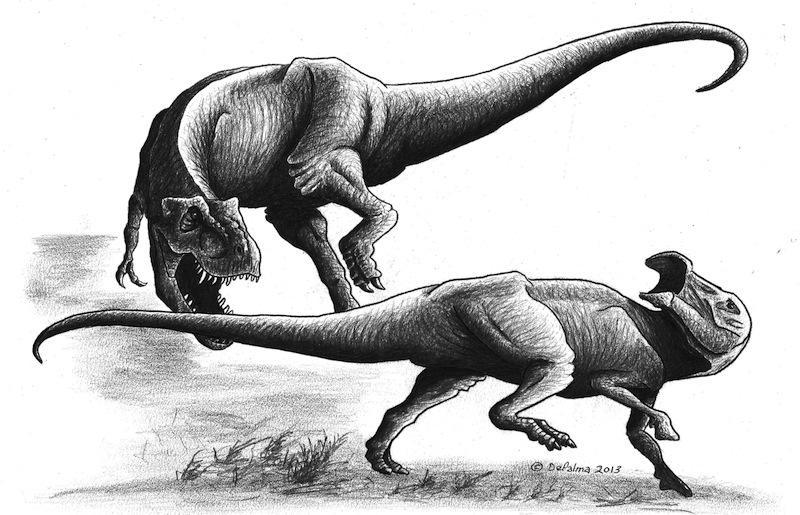Special delivery! See our visiting baby camels (Dec. 6–19) and yaks (Dec. 20–Jan. 5) this holiday. Learn more
Science News
Hunter or Scavenger?
July 16, 2013
by Molly Michelson

T. rex—hunter or scavenger? In this day and age of social freedoms, why not choose both? Because studying dinosaurs, especially fierce, glamorous ones like Tyrannosaurus rex, leads to fame and—well, if not fortune, then at least movie deals.
A study published this week in the Proceedings of the National Academy of Sciences determines, due to dental data, that T. rex was definitely a hunter.
In the Hell Creek Formation of South Dakota, researchers discovered a fossilized spine of a plant-eating hadrosaur that had an odd bone growth. Examining the fossil with a CT scan, the researchers found a tooth—belonging to a T. rex—within the bone. In fact, the bone had grown around the tooth.
“Lo and behold, the tooth plotted out just exactly with T. rex—the only known large theropod from the Hell Creek formation,” exclaims study author David Burnham of the University of Kansas. “We knew we had a T. rex tooth in the tail of a hadrosaur. Better yet, we knew the hadrosaur got away because the bone had begun to heal. Quite possibly it was being pursued by the T. rex when it was bitten. It was going in the right direction—away. The hadrosaur escaped by some stroke of luck.”
T. rex teeth had previously been found in the fossilized bones of a young ceratopsian (Triceratops or one of its kin), but there was no evidence to conclude whether the ceratopsian was alive or dead when the T. rex made a snack of it. The hadrosaur’s escape provides evidence that T. rex was a dangerous, if not always accurate, predator, according to the study’s authors.
Because T. rex regularly shed its teeth, the dinosaur went away hungry, but otherwise no worse for the encounter. It would have grown a new tooth to replace the one left behind in the hadrosaur’s tail. This could have been a typical example of T. rex’s hunting efforts, even if it didn’t result in a meal.
But the story doesn’t end there. Just because you hunt doesn’t mean that’s how you find all your meals, and most scientists agree that T. rex was likely an opportunistic scavenger, too. In fact, researchers and science writers that focus on dinosaurs are tired of the either-or question. “Whether or not T. rex hunted is the most-asked question I get at talks and on the radio. And that makes me sad,” tweeted Brian Switek Monday in response to this study. There are so many more exciting questions in the field, posted paleontologist John Hutchinson, in his blog response to the publication.
So we’ll put it to rest here… T. rex: hunter and scavenger.
Illustration by Robert DePalma II